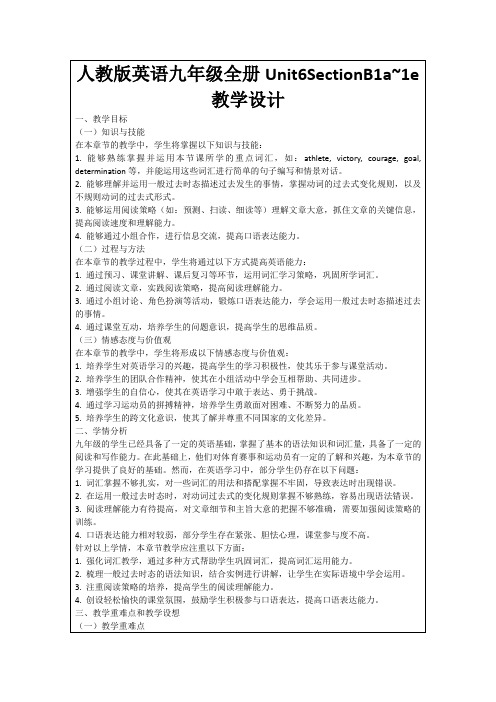2014人教版九年级英语Unit6单元教学设计
- 格式:docx
- 大小:13.50 KB
- 文档页数:1






Unit 6 When was it invented?一.教材分析本单元涉及内容是本书当中比较重要的一部分。
被动语态结构及运用是教学中一个难点和重点,也是学生比较不容易理解的部分,因为它是建立在各种时态之上的。
另外通过对我们熟悉经常使用的发明物的历史来开阔眼界,丰富学生的阅历,使学生养成勤于思考,善于总结的好习惯。
二、教学目标1)知识目标扩容新单词,提高阅读能力。
理解和良好运用被动语态。
2)技能目标能谈论重要发明的历史及用途,能针对各项发明的用处及特点,发表自己的看法,并说明理由。
3)情感目标使学生懂得人类的科学发明创造了丰富的物质文明。
培养学生的创造发明的能力和愿望三、教学重点掌握一般过去时的被动语态四、教学难点弄清主动语态与被动语态的差异,通过练习和运用加以巩固五、教法运用本单元主要采用任务型教学。
在本课的任务型语言教学中,我将依据课程的总体目标并结合教学内容,创造性地设计贴近学生生活实际的任务活动,吸引和组织他们积极参与,使学生通过观察、思考、讨论、交流和合作等方式,在一种自然、真实或模拟真实的情境中体会语言、掌握语言的应用。
六、教学手段1)多媒体辅助:使用自制的课件,使抽象的语言变得直观,为学生运用英语进行交际创设情景,实现师生互动,生生互动和人机互动的多向交流。
2)非测试性评价:重视形成性评价,充分发挥其积极作用,促进新的评价体系的形成。
因此,本课我将各种活动设计成小组活动并开展小组竞赛和填写课堂自我评价表等非测试性评价手段,帮助学生学会自主学习,学会与人合作,培养创新意识以及具备科学的价值观。
七、教学效果预测;1.能够掌握被动语态,并运用到一定的语言环境。
2.通过多媒体和任务的完成学生会突破难点,产生一定创造精神。
3.能完成教学目标,调动学生学习热情。
八、课时安排:6课时九、教学程序Period One Section A 1 (1a-2d)一、教学目标:1. 语言知识目标:1) 能掌握以下单词: heel, scoop, electricity, style, project, pleasure, zipper,daily, website, pioneer, list, mention能掌握以下句型:①—When was the telephone invented?—I think it was invented in 1876.②—What are they used for? —They are used for seeing at night.2) 能谈论物品被发明的时间、发明者,表达某发明的用途。